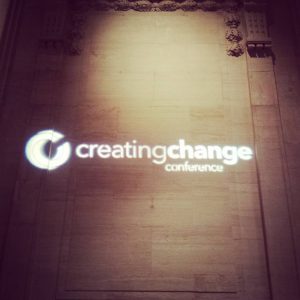 by Carlin Rushing, Program Assistant for the Carpenter Program in Religion, Gender and Sexuality
by Carlin Rushing, Program Assistant for the Carpenter Program in Religion, Gender and Sexuality
The 28th annual Creating Change conference, organized by the National LGBT Task Force, was held in Chicago, Illinois, this year. Bringing together hundreds of organizations, activist, organizers, faith leaders, students, and allies from across the nation to examine the state of the LGBTQ social justice movement, the conference included plenaries, workshops, and day-long institutes focused on issues such as youth homelessness, racial justice, higher education, and faith-based organizing.
The opening plenary entitled, “Black Feminism and the Movement for Black Lives” involved a diverse group of voices including: Black feminist luminary Barbara Smith, Black, trans-activist and writer, Reina Gossett, and queer, Black, youth organizer Charlene Carruthers. The panel discussion modeled for the audience how an intersectional and intergenerational conversation on LGBTQ liberation could look; moreover, the discussion made evident the connections between Black feminist theory and social change praxis necessary for naming, debunking, and eradicating present day iterations of sexism, class oppression, racism, ableism, homophobia, and transphobia. Smith reminded us to find reasons to laugh in the midst of the work. She called a younger generation of writers, activists, and organizers to do work for change while also finding moments to giggle for joy. Of the sessions that I attended, “Drum Yourself Whole,” an interactive session that explored drumming as a spiritual practice, allowed for moments to giggle with joy. Lynn Young of Chicago Theological Seminary and MAK Kneebone of UCC Open and Affirming Coalition, created a workshop space that allowed drummers and non-drummers alike to gather and play. There were moments during the session when our individual rhythms aligned and something new and beautiful was created. There were also moments when the rhythm went awry. We would giggle at the rhythmic disharmony and push through the dissonance. In those moments the collective would listen deeply to self and others until some semblance of unity was re-created. I have been a drummer since I could pick up spoons to bang on pots, pans, and oatmeal box. The workshop reminded me of humor, joy, and sometimes the struggle that comes through nonverbal percussive communication. It also helped to frame the necessity for deep listening, humor, and joy in the midst of collective liberation for all people.
This year the Carpenter Program in Religion, Gender, and Sexuality sent its third cohort of students to the conference so that they might bear witness, listen deeply, and lend their own voices and experiences to this annual conversation about LGBT social change work. Student delegates Shakiya Canty, Levi Dillard, Sarah Jordan, and Marie Tracey were asked to pay attention to the ways their theological education might be deepened and enfleshed through their active participation at Creating Change. Over the next four weeks, these students will offer their reflections on experiences and learnings gleaned while in Chicago.